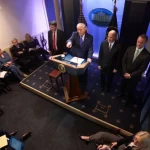

The plan to move forward with foreign aid to Ukraine and Israel could be dead on arrival in the House unless Democrats throw Speaker Mike Johnson (R-LA) a lifeline to overcome opposition within the Republican conference.
Johnson unveiled his long-awaited plan to provide aid to U.S. allies during a closed-door meeting on Monday, proposing to split foreign aid into four separate bills supporting Israel, Ukraine, Taiwan, and other defense measures. However, the plan could be killed before it even arrives on the House floor as several Republicans have already objected to the legislation due to its lack of U.S. border provisions.
Johnson told Republicans in a separate meeting on Tuesday that border provisions would not be germane to the foreign aid package, meaning he would not allow those amendments to be added to the legislation, according to Rep. Bob Good (R-VA).
“That’s a big, big problem,” Good said.
Other Republicans have expressed opposition to Johnson’s proposed process to move the legislation to the Senate.
The plan is to combine all four bills into a single rules package before bringing them to the floor for individual votes. After that, the bills that are passed will be combined into a single piece of legislation to be voted on in the Senate, according to several lawmakers.
“[Johnson’s] intent to merge them together before sending them to the Senate is wrong,” said Rep. Andy Biggs (R-AZ). “Israel funding should not be held hostage by Ukraine funding. The American people deserve to know where their senators stand on each funding component.”
Under typical House procedure, a bill is brought to the floor under a rule that must be approved by lawmakers before it can be debated or voted on. A rule is historically passed along party lines and rarely fails on the House floor. However, House conservatives have weaponized the procedure several times over the last year, tanking key pieces of legislation and stalling action on the floor.
A handful of lawmakers have already threatened to vote against the rule, with Rules Committee member Thomas Massie (R-KY) arguing the package should not even be brought to the committee because “it’s going to die on the floor.”
But Democrats could buck tradition to vote in favor of the rule, throwing Johnson a lifeline as he pushes to advance foreign aid for Ukraine and Israel.
Rules Committee ranking member Jim McGovern (D-MA) said he’s gotten “no indication” on when the committee will meet to discuss the aid package.
“So I’ve been told that we may be here until Friday night or later,” McGovern said. “I don’t know what that means for when they want to reconvene the Rules Committee.”
Hovering over Johnson’s head is a discharge petition to bring the Senate supplemental to the House floor, which currently has 195 signatures as of Tuesday. Some Republicans have suggested they would sign onto the petition to bring it to the floor without needing Johnson’s approval, meaning Democrats could let Johnson’s package fall through the cracks and throw their full weight behind the petition.
However, House Democratic Caucus Chairman Pete Aguilar (D-CA) said Democrats would not “sink” any plans to “deliver aid to our allies.”
“Our focus is on delivery,” Aguilar told reporters on Tuesday. “Like I mentioned, we’re less concerned about what process is used.”
“But this needs to happen by the end of the week. There is some urgency here,” the caucus chairman added.
It’s not yet clear how quickly the House will move forward with voting on the four bills as legislative text has not yet been finalized. Under House rules, leaders must provide lawmakers 72 hours to review bill text before bringing it to the floor for a vote, which could drag the process into the weekend.
CLICK HERE TO READ MORE FROM THE WASHINGTON EXAMINER
The bills, if passed, would then be passed to the Senate, where their futures are not as certain. Senate Majority Leader Chuck Schumer (D-NY) did not commit to considering the legislation should it make it to the upper chamber, telling reporters on Monday, “We’ve got to take a look at it.”
Vice Chair Ted Lieu (D-CA) said during the caucus press conference that if Johnson’s foreign plan is without one of the Senate supplemental’s four components — aid to Ukraine, Israel, Gaza, and Taiwan — then it is “highly unlikely Democrats would support it.”






